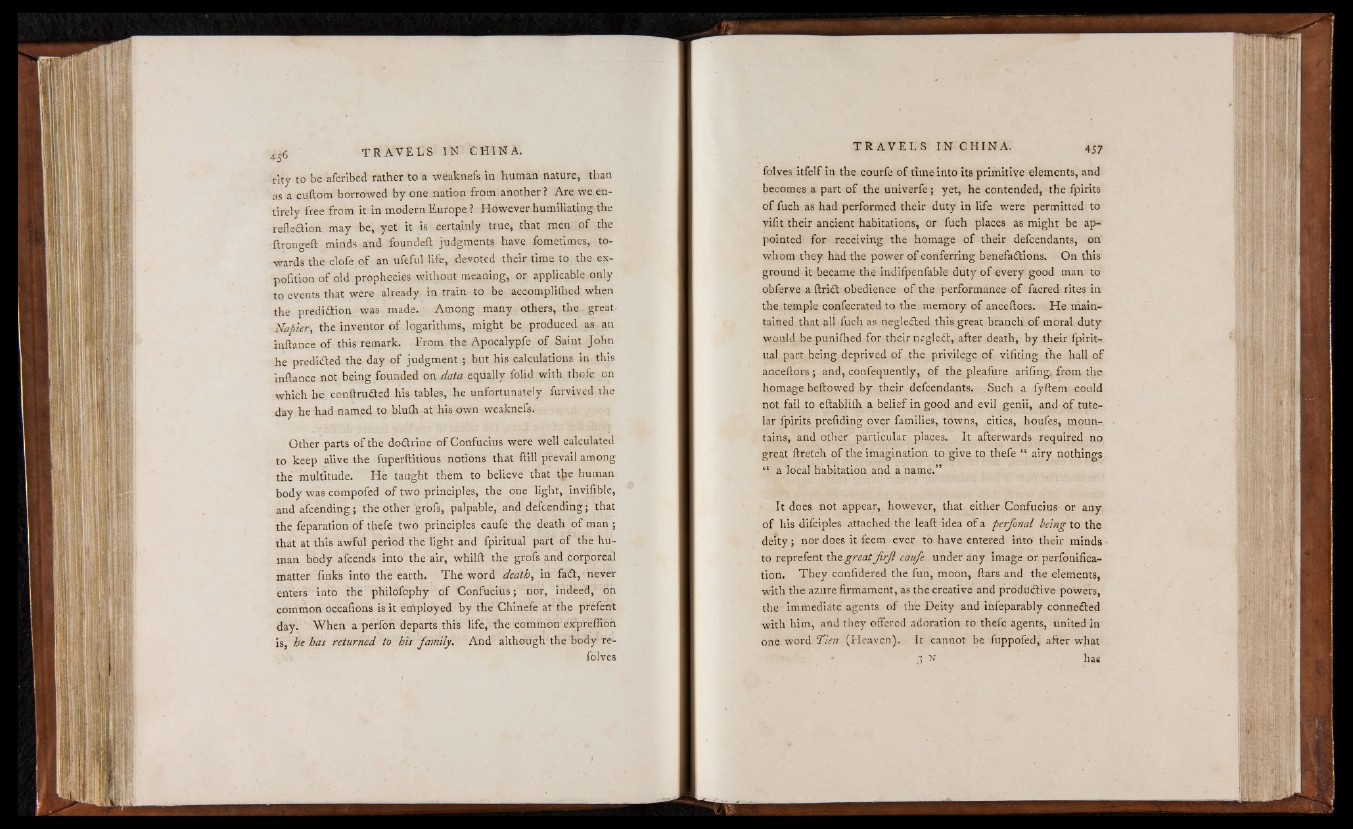
rity to be afcribed rather to a weaknefs in human nature, than
as a cuftom borrowed by one nation from another ? Are we entirely
free from it in modern Europe ? However humiliating the
reflection may be, yet it is certainly true, that men o f the
ftrongeft minds and founded judgments have fometimes, towards
the clofe o f an ufeful life, devoted their time to the ex-
pofition o f old prophecies without meaning, or applicable only
to events that were already in train to be accompliihed when
the prediction was made. Among many others, th e . great.
Napier, the inventor o f logarithms, might be produced as an
inftance o f this remark. From the Apocalypfe o f Saint John
he predicted the day o f judgment ; but his calculations in this
inftance not being founded on data equally folid with thofe on
which he conftruCted his tables, he unfortunately furvived the
day he had named to bluih at his own weaknefs.
Other parts o f the doCtrine o f Confucius were well calculated
to keep alive the fuperftitious notions that ftill prevail among
the multitude. He taught them to believe that the human
body was compofed o f two principles, the one light, invifible,
and afcending; the other 'grofs, palpable, and defcendlng; that
the feparation o f thefe two principles caufe the death o f man ;
that at this awful period the light and fpirltual part o f the human
body afcends into the air, whilft the grofs and corporeal
matter finks into the earth. The word death, in fa£t, never
enters into the philofophy o f Confucius; nor, indeed, on
common occafions is it employed by the Chinefe at the prefent
day. When a perfon departs this life, the common expreffion
is, he has returned to bis family. And although the body refolves
folves itfelf in the courfe o f time into its primitive elements, and
becomes a part o f the univerfe ; yet, he contended, the fpirits
o f fuch as had performed their duty in life were permitted to
vifit their ancient habitations, or fuch places as might be appointed
for receiving the homage o f their defcendants, on
whom they had the power o f conferring benefactions. On this
ground it became the indifpenfable duty o f every good man to
obferve a ftriCt obedience o f the performance o f facred rites in
the temple confecrated to the memory o f anceftors. He maintained
that all fuch as negledted this great branch o f moral duty
would be punifhed for their neglect, after death, by their fpiritual
part being deprived o f the privilege o f vifiting the hall o f
anceftors ; and, confequently, o f the pleafure arifing. from the
homage beftowed by their defcendants. Such a fyftem could
not fail to eftabliih a belief in good and evil genii, and o f tutelar
fpirits prefiding over families, towns, cities, boufes, mountains,
and other" particular places. It afterwards required no
great ftretch o f the imagination to give to thefe “ airy nothings
“ a local habitation and a name.”
It does not appear, however, that either Confucius or any
o f his difciples attached the leaft idea o f a ptrfonal being to the
deity; nor does it feem ever to have entered into their minds
to reprefent 'Cat great f r j l caufe under any image or perfonifica-
tion. T he y confidered the fun, moon, ftars and the elements,
with the azure firmament, as the creative and productive powers,
the immediate agents o f th'e Deity and infeparably connedted
with him, and they offered adoration to thefe agents, united in
one word Lien (Heaven). It cannot be fuppofed, after what
3 n . has